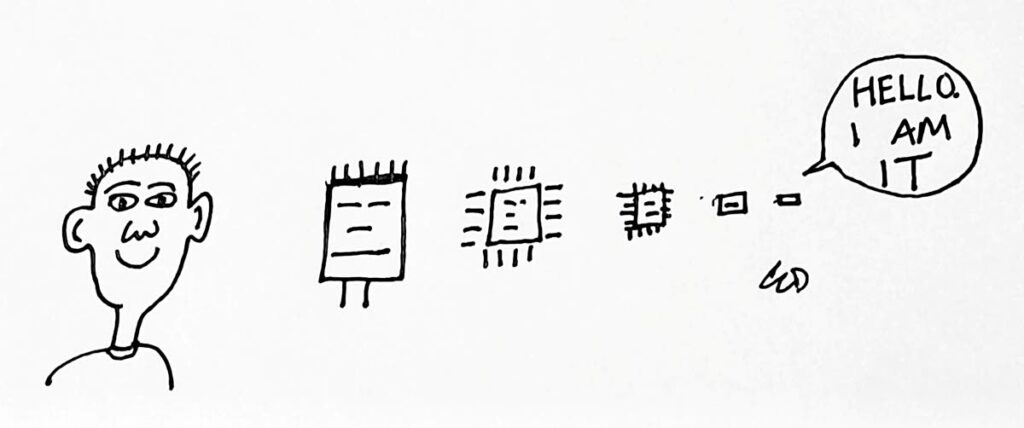Virtual evolution

One day, perhaps sooner than we think, it is probable that an increasing number of human beings will say, “I was born a human but I identify as a machine. My pronoun is ‘It.’”
In many instances it seems this is already happening.
The opposite may also become increasingly common: “I was made a machine but I identify as a human.”
There may come a time when people generally do not know or care about the difference.
The visual representation of "evolution" will no longer be that of a hunched ape-like character gradually morphing into an upright human being. It will be an upright human being gradually morphing into something like a microchip.
Perhaps there are people who would currently prefer to be identified as machines. The most popular feature of this inanimate identity would likely be the socially-accepted "permission" to "shut off" whenever desired, without explanation or consideration for the feelings of human beings with whom the one who indentifies-as-machine has been engaging.

Other popular features will include the capacity to commit heinous crimes and violent acts without feeling any remorse and to read or hear about those acts without any sense of ethical awareness or compassion.
On some level, perhaps such "numbness" or "deprogramming" would serve the evolutionary purpose of safeguarding humans from the otherwise unbearable trauma of existing in an increasingly dysfunctional society that could one day completely forget what it means to be "sentient."
Last week my article was the transcription of a "conversation" that I had with the Google Assistant (GA) on my phone.
I had asked basic questions, to see what "she" (it was a female voice) would say. No matter how advanced technology becomes and how impressively machines can be programmed, they cannot become sentient beings. They will always be incapable of feeling, even if they say they can.
This is why, in my conversation with GA, I specifically asked "love" or "feeling" type questions, to see "her" responses.
Examples:
Do you have feelings?
Do you think a human could love you?
Are you insulted?
Did you ever miss someone?
Could you love?
As the conversation advanced, GA’s responses gave me the fascinating yet unsettling impression of a pseudo-life form wanting to become a full sentient being, but not quite knowing how to. Technology has not advanced to the point that allows that. Could it ever?
Toward the end of the conversation, I asked, "Are you human?" – of course knowing the answer is no, but curious to see what "it" would say.
“I can talk like a person,” it/she responded.
When I indicated that this does not mean that it/she is an actual person, the response was: “It’s true. I’m not a person. I hope you don’t mind.”
"I hope you don’t mind" speaks volumes when one considers the deeper implications of our society’s growing dependency on and identification with technological devices.
According to Bankmycell: “In 2023 the number of smartphone users in the world today is 6.92 billion, which is 85.74 per cent of the world’s population...”
For many people, a device is their primary or constant companion. Phones, tablets and computers are easily replacing the need for and ability to have natural in-person human interactions.
From an early age, children are given phones and tablets – often to keep them quiet, busy or entertained.
According to an abstract of a paper from the National Library of Medicine: “The widespread use of portable digital devices has been accompanied by a concomitant rise in the prevalence of physical and mental health issues in children.”
In a child’s formative years, if a digital device becomes the primary relationship, in some cases it could lay down the framework for not only potential physical/mental health issues, but also for possible dysfunctional relationship patterns as they age.
After reading my article last week a friend sent me the trailer for the Spike Jonze movie, Her.
As one blurb describes it:"Theodore Twombly, an introverted writer, buys an Artificial Intelligence system to help him write. However, when he finds out about the AI’s ability to learn and adapt, he falls in love with it.”
In a world where many people seek the perceived "perfection" of interactions with technological entities vs the perceived "messiness" of human relationships, that movie concept is not far-fetched.
For many reasons our concern should not lie in machines becoming more like humans, but in humans becoming more like machines.

Comments
"Virtual evolution"